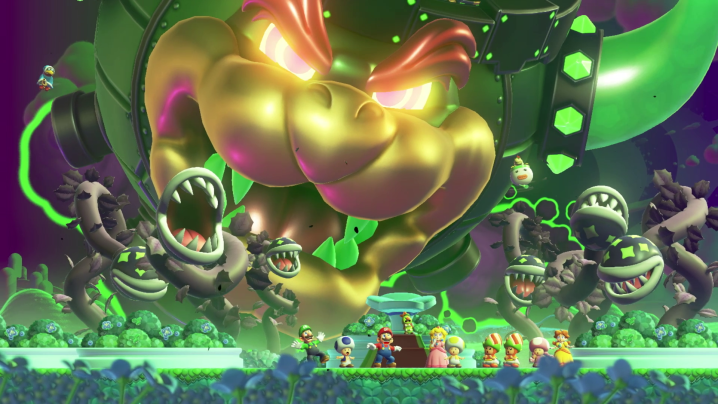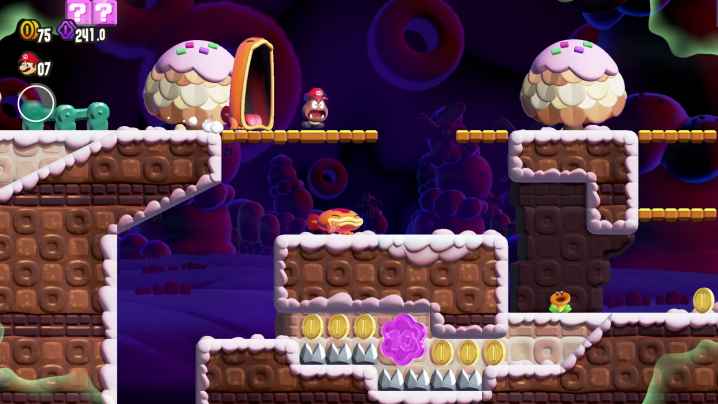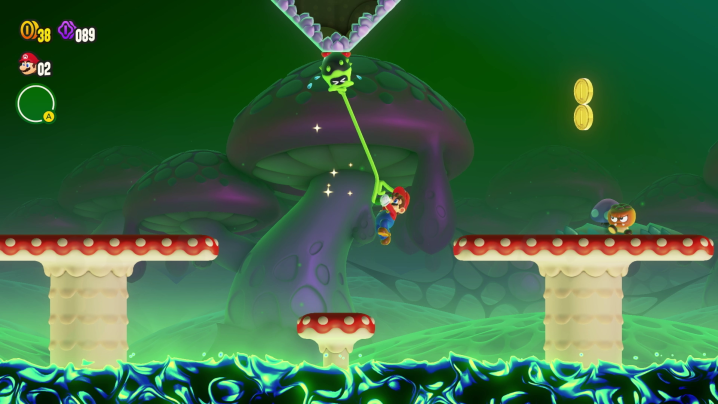“Super Mario Bros. Wonder is both a return to form and a delightful transformation of the classic 2D series.”
- Art is full of personality
- Fun new enemies
- Strong level design
- Unpredictable Wonder effects
- Badges are a great addition
- Underwhelming bosses
- Power-ups are a missed opportunity
The most important journey Super Mario Bros. Wonder took me on wasn’t to the colorful Flower Kingdom, but somewhere much more familiar: my friend Jamie’s living room.
It was there I’d see Super Mario Bros. 3 beaten start to finish for the first time, a formative memory in my gaming history. My friends would gather one night and hook a Super Nintendo and Super Mario All-Stars up to Jamie’s TV, trading the controller back and forth until Bowser was vanquished. It was a revelation for someone who’d never even made it out of Desert Land. I remember the delight of first seeing what we’d dub “Little Big World” and the awe when I saw Mario climb up to the clouds for the first time. It was an eye-opening digital experience; anything and everything felt possible.
That feeling finally returned to me in Super Mario Bros. Wonder. The latest entry in Nintendo’s golden franchise takes the series back to its 2D roots, but not for another nostalgic retread. It’s a genuine reinvention of the Mario formula that brings back something the series’ side-scrolling installments have lacked for decades: the art of surprise.
With its wealth of unpredictable levels, Super Mario Bros. Wonder is the series’ best 2D entry since its SNES days. It’s still the same familiar platformer, but one that’s been given a new lease on life thanks to a fantastic new art style, delightfully absurd transformations, and flexible difficulty. It’s the closest I’ve gotten to recapturing those magic moments with the original platformers, even if there’s still room for Mario to grow into his new overalls.
Video review
An artistic refresh
Super Mario Bros. Wonder presents itself as a fairly typical Mario adventure at first glance. The Mushroom Kingdom crew meets a new race of leafy critters called the Florians residing in the Flower Kingdom. It doesn’t take long before Bowser makes his appearance, bringing his signature brand of reptilian chaos to a new world. From there, I’m off to different themed worlds to collect coins, power-ups, and colorful MacGuffins from a gauntlet of 2D platforming stages. Anyone who has ever seen a Mario game will know what to expect and newcomers won’t have much trouble picking its foolproof run and jump gameplay up.

Though it may sound a little typical, it all feels refreshingly reimagined. Rather than presenting another interchangeable throwback to the series’ 2D heyday, Super Mario Bros. Wonder twists the Mario formula in increasingly surprising ways. That’s clear from its revamped art style alone. From the very first stage, I’m dropped into a vibrant level awash in cool blue colors and rich with detail. It’s almost like I’m looking at a Van Gogh painting reimagined into Mario’s usual art style.
The aesthetic shifts go a long way toward making Wonder feel like a revitalized experience. When I first see a Goomba, it isn’t just mindlessly shuffling back and forth. Instead, it’s snoozing on a pipe, with a big bubble forming from its drooping mouth. I walk through the pipe it’s sitting on and watch as Mario gets sucked in so fast that his hat briefly floats at the entrance before he reaches out and tugs it in with him. There’s a lot more personality to be found in even the smallest animations, adding life to Mario’s 2D world.
Each creative swing comes together to transform Mario’s world in a way the 2D series hasn’t seen since Super Mario Bros. 2.
That same level of detail is reflected in audio design. When Mario performs a ground pound, it’s accompanied by a little snare drum roll and cymbal crash as he hits the ground. It’s a page right out of the Looney Tunes playbook, which is fitting considering that Wonder plays a bit more like an interactive cartoon complete with musical interludes. The only area that mildly backfires is with the introduction of talkative flowers strewn around levels who drop both helpful hints and grating one-liners (perhaps a bit of Mario movie studio Illumination rubbing off on Nintendo).
The most impactful artistic change comes from a refreshed army of enemies populating the Flower Kingdom. Maw-Maws are adorable little critters that gobble up everything in their path, while Blewbirds fire their beaks out like a dart, inadvertently creating walkable platforms. And that’s only a tiny taste; Super Mario Wonder includes the most bountiful wealth of original creature designs I’ve seen from the series in decades. While everything is still grounded in the familiar Mario style, each creative swing comes together to transform Mario’s world in a way the 2D series hasn’t seen since Super Mario Bros. 2.
Transformative platforming
Super Mario Bros. Wonder isn’t just an aesthetic shake-up; it pulls the series’ platforming out of a creative dead end. While still perfectly fun, games like New Super Mario Bros. U had begun to feel like stale remixes of preexisting ideas. That reached its logical conclusion with Super Mario Maker, a level design tool so powerful that it almost cut out the need for new 2D Mario games. Anything releasing in its wake would need to bring some truly fresh ideas to the table that couldn’t be replicated by a fan cleverly tossing assets together. That’s exactly what Wonder accomplishes.
It’s not that the core structure has changed much. Each level still finds Nintendo flexing its design expertise with consistently delightful stages that introduce a clever twist and riff on it to the final flagpole. One desert stage has me jumping off the backs of bouncy Bloomps to avoid pits and reach far-off coins. Levels aren’t just rich with new ideas, but well-hidden secrets too. Alternate exits and well-hidden flower coins had me returning to stages multiple times, almost treating them more like puzzles to be solved.
Super Mario Wonder reignites that spark, putting that childlike wonder back in the series.
What really makes this installment special is all the ways it subverts the Mario formula. That’s largely thanks to its namesake Wonder system, which finds Nintendo at its most joyfully creative. Each level contains a hidden Wonder Seed, which triggers some sort of gameplay twist. One effect turns me into a helpless Goomba that needs to sneak past hungry Maw-Maws. Another has me rolling on a giant snowball that knocks down every piece of the level in its path — including the end flagpole. Each one is a surprising, and often hilarious, treat to discover, giving each level a trippy charm akin to the all-time great Touch Fuzzy, Get Dizzy from Super Mario World 2: Yoshi’s Island.
It wasn’t until those sequences that I realized what nearly every 2D Mario game has been missing since Super Mario World. In the series’ earliest days, rules were made to be broken. I remember the thrill of running on top of Super Mario Bros.’ opening the underground level for the first time and discovering its secret warp zone. Even that moment when I first stumbled into Super Mario Bros. 3’s “Little Big World” felt like a shocking revelation, shattering everything I thought I knew as I ran from an enormous Goombas. It wasn’t the tight platforming that made these games feel revolutionary; it was their ability to show off the endless potential of video games. At their best, they could twist and turn in unpredictable ways that pushed the limits of our imaginations. Super Mario Bros. Wonder reignites that spark, putting that childlike wonder back in the series.

There’s still more room for Nintendo to fully recapture that magic. Traditional boss fights only riff on a small handful of ideas, making the central Bowser conflict feel like more of an afterthought than usual. Power-ups are a mixed creative bag too. There are only four total and there aren’t a lot of creative uses for them across a huge collection of stages. That’s a shame considering that Mario’s new elephant power-up is one of the franchise’s best. In addition to having more uses than your average fire flower (he can thwack enemies with his trunk or splash dead plants with water), it just makes for a hilarious visual that’s sure to get smiles out of players of all ages. It’s a bit of a letdown that there’s nothing else in the game quite like it, as the new drill and bubble powers feel more expected.
That’s the one risk that a game so dependent on the element of surprise runs. It’s hard to avoid the tinge of disappointment that comes when I find a level’s Wonder effect and find a double dip of what I’ve already seen. It’s the same problem that last year’s standout Kirby and the Forgotten Land struggled with once it ran out of hilarious transformations to catch players off guard. Fortunately, Super Mario Wonder works overtime to minimize those moments, delivering a treasure trove of cartoon delights.
Shifting the structure
While the big picture changes in Super Mario Bros. Wonder will garner the most attention, some of its smaller additions are just as impactful. For instance, Nintendo turns Mario into a much stronger multiplayer proposition here thanks to a huge cast of playable characters and fun online modes like competitive level races. The secret-filled levels make co-op more appealing too, as some tricky, puzzle-focused bonus levels can really leave solo players racking their brains as they search for well-hidden items.
The times when Super Mario Bros. Wonder feels most like a Mario game are, ironically, when it’s least like one.
Wonder presents a great challenge balance across the board. Each level now has a difficulty rating and five-star stages are no joke. I lost plenty of lives to levels that require precise timing and platforming mastery. Nintendo is careful not to alienate younger fans, though, as a more open overworld structure means that players only need to beat a handful of levels in a world to clear it. That can make the overall difficulty curve feel a little start and stop, but it’s a smart way to make sure Wonder can work for players from a wide range of ages and skill levels.
Perhaps the most important addition here is a new badge system, which opens up a lot of potential for the series’ future. At the start of each level, players can equip a badge that’ll give them an extra ability. Those skills range from a grappling vine that can latch onto walls to a coin magnet. Badges have two separate applications that are equally important. On one hand, they can be used as assist tools to help younger players out (like a Safety Bounce that prevents one nasty fall). Those can also be handy tools for secret exploration, as something like a wall-climbing jump can help players more easily suss out hidden areas. Heck, I imagine speedrunners will even get extra mileage out of badges like the super speedy Jet Run.

When I reflect on successful systems like this, my temptation is to pray that Nintendo carries these ideas over to its next 2D Mario game. That’s where I have to catch myself. The times when Super Mario Bros. Wonder feels most like a Mario game are, ironically, when it’s least like one. It’s those unpredictable moments where I’m suddenly scaling a level’s walls from a top-down perspective or skydiving through the clouds that bring me back to my friend’s living room. I’m a kid experiencing Super Mario Bros. 3 for the first time again, mouth agape as each new secret reveals itself.
Super Mario Bros. Wonder is as special as it is because there’s no other Mario game like it. And I hope it stays that way.
Super Mario Bros. Wonder was tested on a Nintendo Switch OLED in handheld mode and on a TCL 6-Series R635 when docked.





